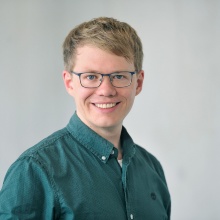Benjamin Unger, leader of the Independent Junior Research Group Dynamical Systems at SimTech, will leave the Cluster of Excellence to take up a Tenure-Track Professorship in Data-Driven Methods for Partial Differential Equations at the Karlsruhe Institute of Technology (KIT), starting April 1, 2025.
At KIT’s Institute for Applied and Numerical Mathematics, Unger will build upon the research he initiated at SimTech, continuing his work on surrogate modeling, certified machine learning, and the analysis of complex dynamical systems. His focus on mathematical and physical guarantees - such as error estimators, passivity, and structure preservation - directly connects to the objectives of his SimTech research group.
Unger’s research
A particular focus of his work lies in the approximation and learning of port-Hamiltonian systems, a powerful framework for modeling energy-based multi-physics systems. These systems are central to many modern engineering applications, from power networks to biomechanics, and require structure-preserving techniques to ensure physical consistency and stability. Unger’s group has contributed innovative methods for reducing and identifying such systems while retaining their inherent mathematical properties.
Beyond port-Hamiltonian systems, Unger has addressed challenges in model order reduction for systems with slowly decaying Kolmogorov n-widths, such as transport-dominated phenomena, and developed a novel geometric framework that allows a seamless incorporation of data-driven methods such as neural networks. His work integrates advanced system identification techniques - including dynamic mode decomposition, the Loewner framework, and physics-informed machine learning - to develop surrogate models even when direct access to governing equations is limited.
In addition, his research on delay differential-algebraic equations bridges the gap between infinite-dimensional theory and practical computation, with implications for hybrid numerical-experimental modeling, such as in earthquake simulations or coupled physical-virtual systems.
The new position
The new position at KIT aligns closely with this multifaceted research agenda. His expertise in data-driven techniques for systems governed by partial differential equations is particularly well suited to KIT’s strategic initiatives, including the Collaborative Research Center 1173 Wave Phenomena and the interdisciplinary KIT Center MathSEE, in which Unger plans to be actively involved.
Returning to KIT also marks a personal milestone. “Having completed my undergraduate studies at KIT, it feels truly special to return to my alma mater,” says Unger. “I’m excited about the opportunity to further develop my research in such a strong academic environment and to build a long-term perspective for my group.”
“Benjamin Unger is a prime example of what SimTech stands for,” says Miriam Schulte, one of the speakers of the Cluster of Excellence. “We aim to provide early career researchers with the freedom and support to pursue ambitious research agendas - and seeing Benjamin now take this next step makes us incredibly proud.”
Jenny Kopsch-Xhema, SimTech’s managing director, adds: “Benjamin’s appointment underscores SimTech’s role as a hub for talent and academic growth. His path from junior group leader to tenure-track professor reflects the strength of our support structures and the excellence of our researchers.”
We sincerely congratulate Benjamin Unger on this exciting new chapter and thank him for his outstanding contributions to the SimTech community.


